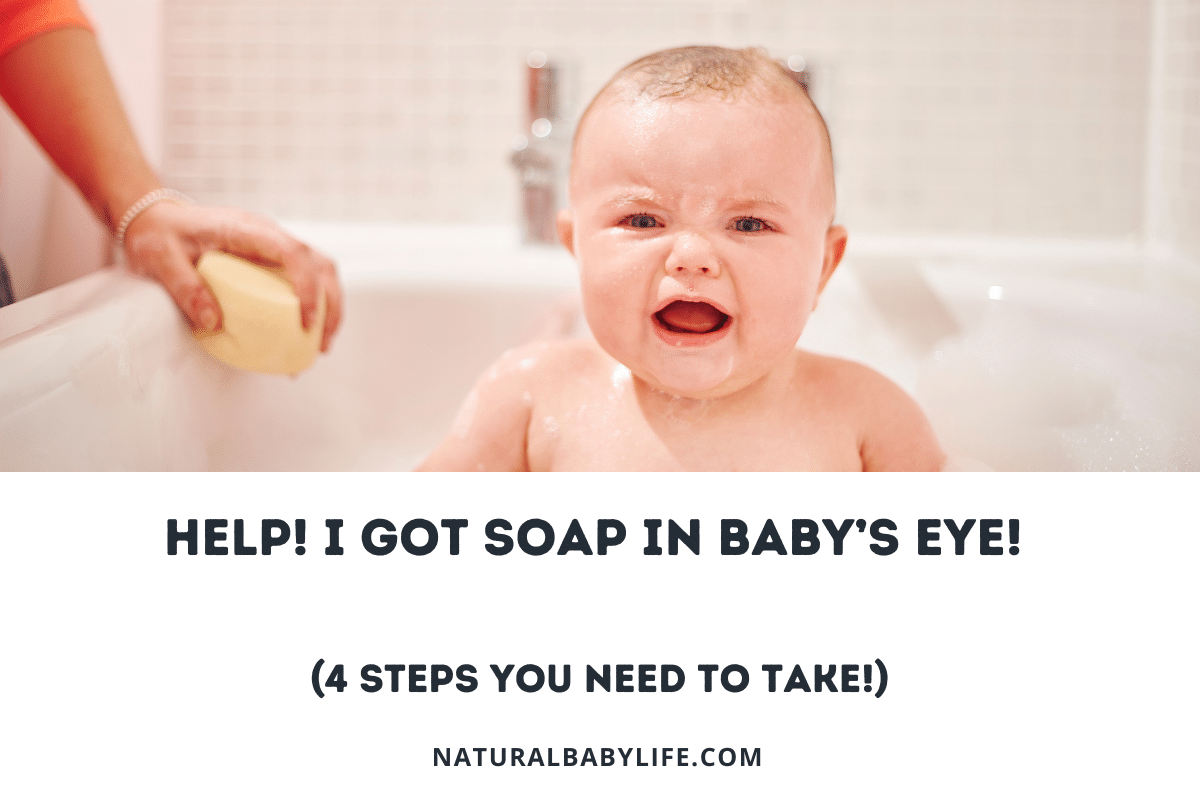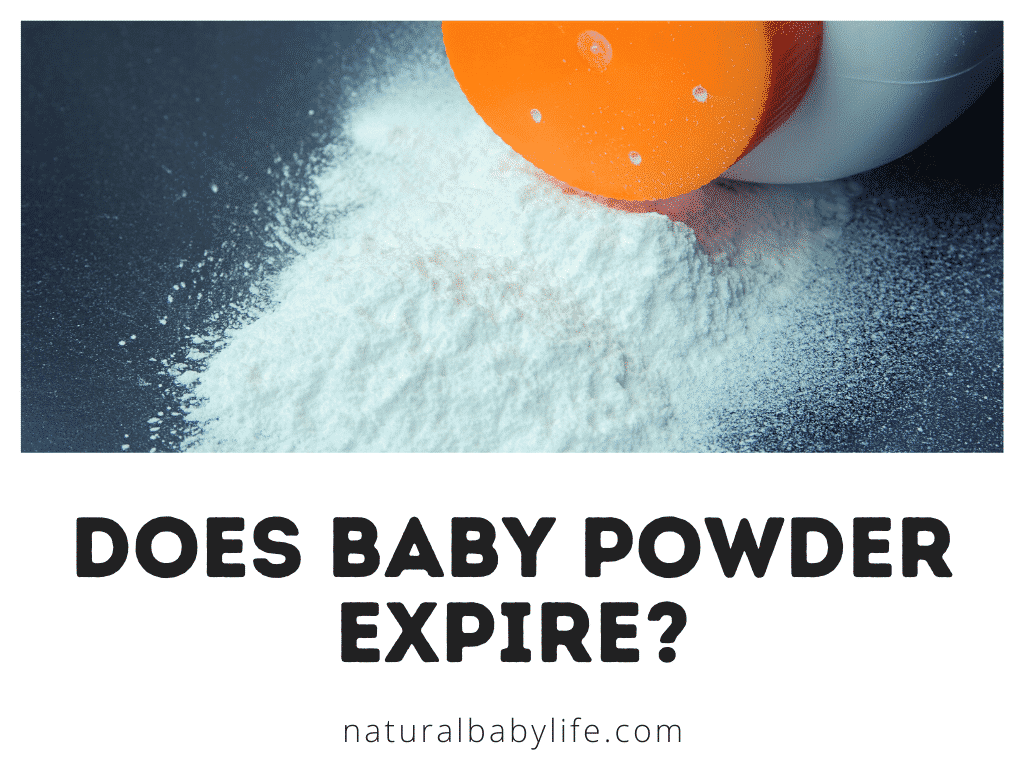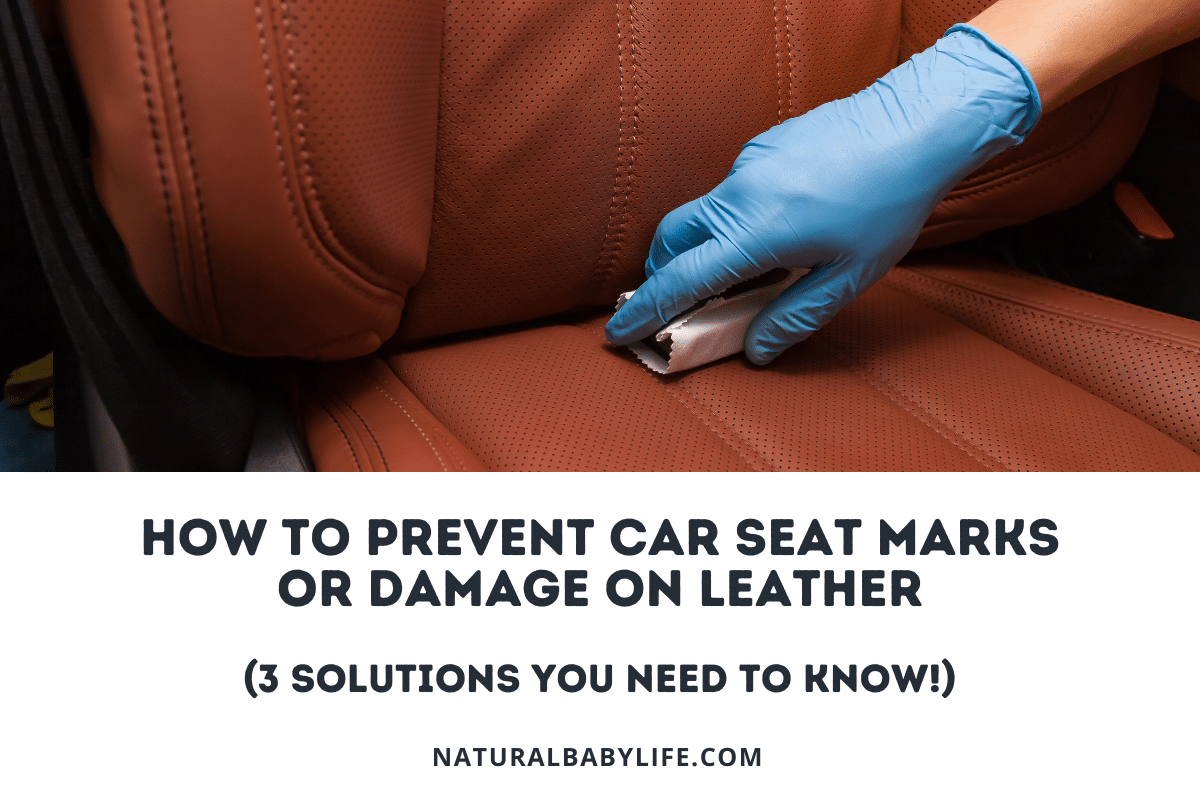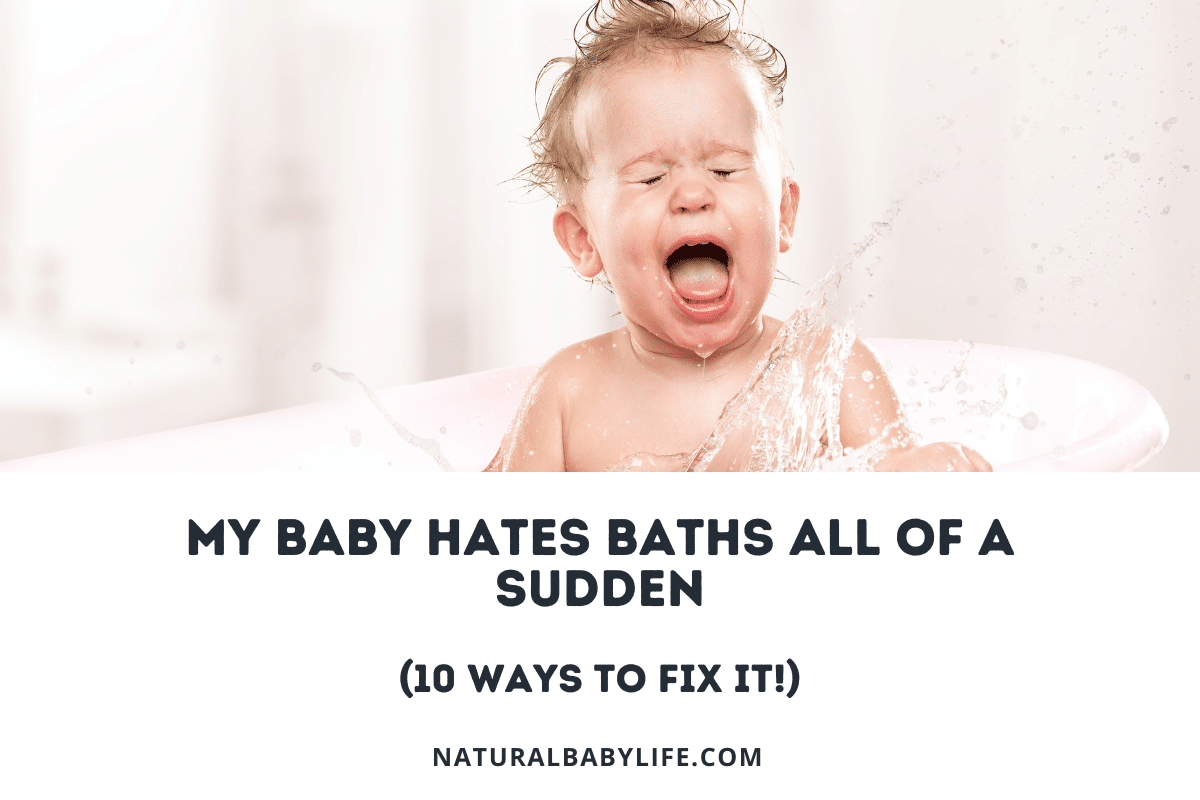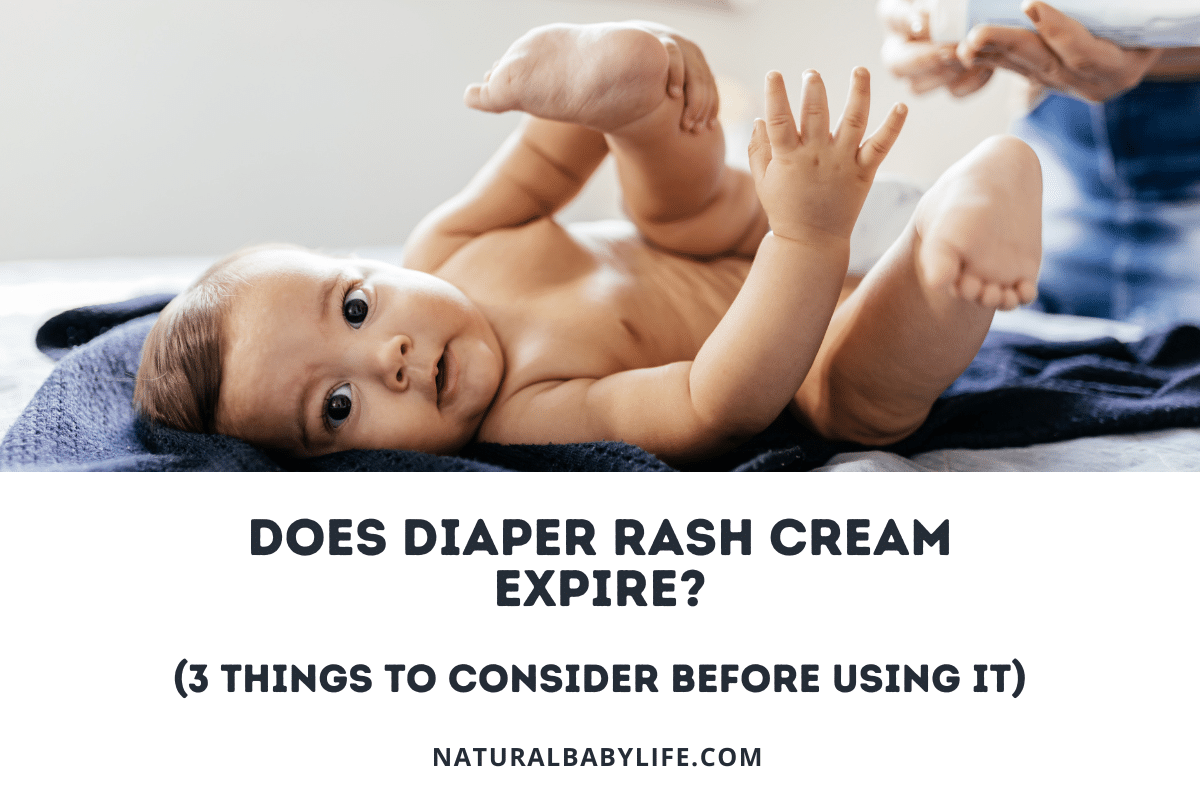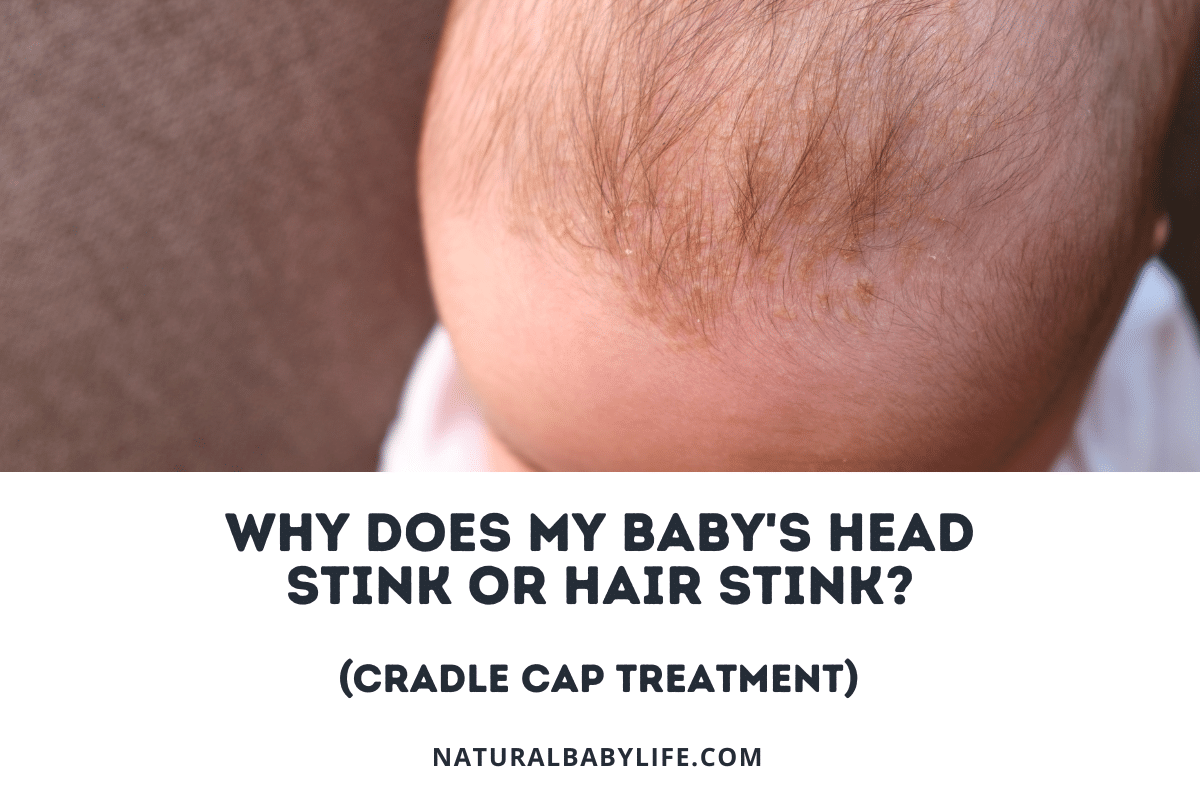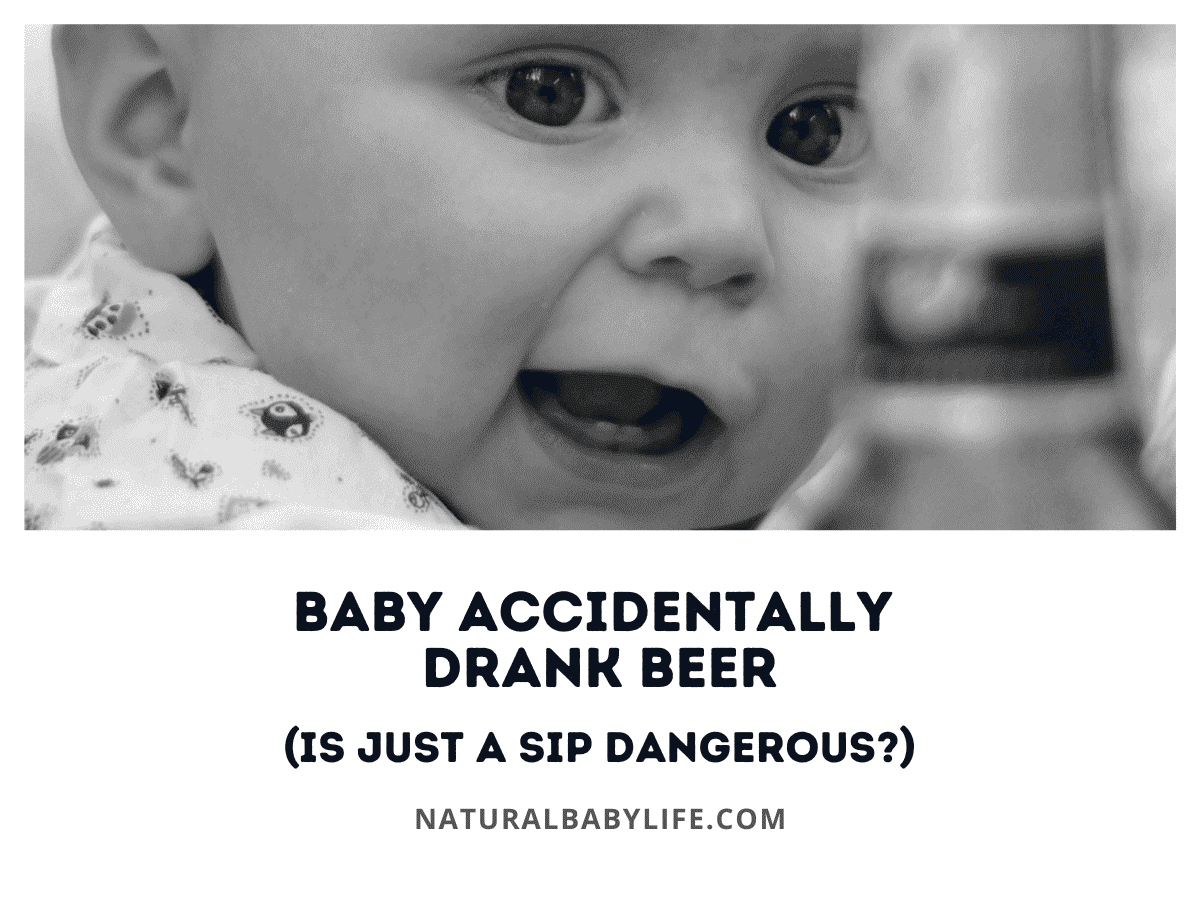We’re all familiar with the stinging, burning pain of getting soap in our eyes. Though it may be pretty common, getting soap in our eyes can be distressing, and it’s even worse when you got soap in baby’s eye. It can be difficult to avoid but you might have wondered what you should do if that happens to your little one.
Getting soap in your baby’s eyes is unlikely to result in severe injury; however, it can cause a great deal of irritation resulting in watery eyes and redness. Quickly removing the soap with a clean damp washcloth or stream of water will help relieve the pain and reduce adverse effects. If you’re concerned about your little one’s eyes, try using a mild tear-free shampoo.
Keep reading to learn more about what to do if you get soap in your baby’s eyes, which soaps are best for your little one, and what ingredients to avoid.
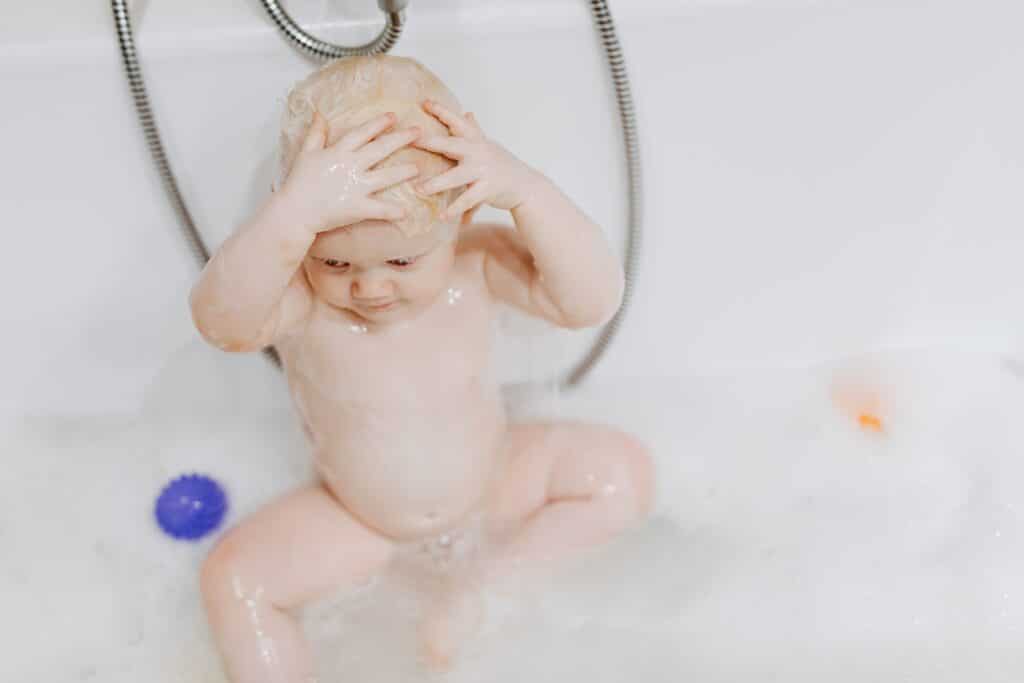
Table of Contents
What to do if I got soap in baby’s eye
Getting soap or shampoo in your baby’s eyes can be worrisome. No one wants to see their baby in discomfort, but it’s no cause for panic. According to the American Academy of Ophthalmology, soap will not cause serious eye damage.
Though soap isn’t a major threat, it can cause a great deal of irritation. If you get soap or shampoo in your baby’s eyes, here are some symptoms your baby may exhibit:
- Burning in the eyes
- Blurred vision
- Watery eyes
- Red eyes or redness surrounding the eyes
Understandably uncomfortable, your baby may instinctively rub their eyes. Avoid allowing this as it may spread the soap throughout and deeper into the eye. Crying or eye-watering is normal and will help clear the eyes of soap. However, you shouldn’t wait for the soap to naturally work its way out. Instead, actively treat your baby’s eyes to minimize irritation and potential injury.
Can soap irritate baby’s eyes?
Though they can cause significant irritation, most soaps and shampoos are formulated to be safe for eyes in moderation.
Soaps are salts of fatty acids that act as surfactants and emulsifiers, allowing dirt and oil to be easily washed away by water. These properties make soap an excellent cleanser. Soap, by definition, is naturally alkaline, with a pH of around 9 to 10.
The high pH of soap is the primary reason it causes eye irritation. The pH of the human eye is roughly neutral. When soap gets into the eye, the eye’s pH is thrown off balance, which causes burning, redness, and tears.
Depending on the formulation, a soap may be more or less irritating. Aside from the pH, additives like fragrance, preservatives, and active ingredients can cause increased eye irritation.
If soap does get in your baby’s eye, you can reduce the irritation by actively treating their eyes. To get the soap out of your baby’s eyes:
- Wet a clean washcloth with warm water.
- Gently wipe your baby’s eyes until their discomfort has subsided.
- If your baby remains distressed, flush their eyes with a clean stream of lukewarm water for up to 20 minutes.
- Contact your pediatrician or ophthalmologist if your baby’s symptoms don’t improve or if they worsen.
Each baby product may impact your baby’s eyes differently depending on the ingredients. Let’s take a look at some of the most common bath time products.
Baby shampoo/body wash
There is no need to use a harsh, heavy-duty cleanser when you are bathing your little one.
Baby shampoos and soaps typically have a pH closer to the natural pH of skin and eyes, which is near neutral (pH 7). They also tend to have less or no fragrance and fewer unnecessary ingredients, like essential oils and harsh detergents.
Baby shampoos and body wash are specifically designed to be gentle on your baby’s skin. They may even be marketed as “tear-free.”
Normal shampoo/body wash
Normal shampoo and body wash usually have added ingredients that target additional concerns which make them antibacterial, odor-controlling, anti-aging, clarifying, or exfoliating, among other features.
Getting normal soap or body wash into your baby’s eyes will likely cause a greater amount of irritation because, unlike baby soaps and shampoos, these are not specifically formulated to be gentle on the eyes.
These added ingredients are not necessary for babies and can increase the likelihood of irritation.
Medicated shampoo
Medicated shampoos, such as Head & Shoulders Dandruff Shampoo, are sometimes recommended by pediatricians to treat cradle cap in babies.
Though effective, pyrithione zinc, the active ingredient found in many dandruff shampoos can cause increased irritation to the eyes.
Johns Hopkins All Children Hospital recommends staying away from anti-seborrhea shampoos as well as anti-fungals and steroid creams.
If your baby suffers from cradle cap:
- Shampoo your baby’s hair with a gentle, tear-free shampoo.
- Use a toothbrush or soft-bristled brush to loosen flakes.
- If flakes persist, apply a small amount of petroleum jelly or mineral oil to the affected area, and let it soak in (several minutes to hours).
- Again, exfoliate your baby’s head with a toothbrush or soft-bristled brush.
- Shampoo as usual.
Dish soap
Like body wash and shampoo, dish soap contains a surfactant that allows it to cut through grease and grime. In contrast to popular belief, most popular dish soaps such as Dawn Liquid Dish Soap, are no more caustic than many body soaps on the market.
Although dish soap has some of the same ingredients found in body wash and shampoos, it lacks conditioning properties that are found in many body care products. Because of this, using dish soap as a body wash or shampoo may leave your little one’s skin and hair feeling stripped of its natural oils.
Though not recommended for the skin and hair, if dish soap gets in your little one’s eye, the treatment should be the same as if it were shampoo or body wash. This requires you to flush the eye with clean water until the stinging subsides.
Castile soaps are sometimes found in natural dish detergents. Though these soaps are more natural, they often have a higher pH than traditional dish detergents, ranging up to a pH of 11.5. So keep in mind, even if a product is considered more “natural,” it is not necessarily safer.
Along with more caustic dish detergents, care should be taken when using dish soaps with the following ingredients:
- Bleach
- Ammonia
- Sodium hydroxide (in high concentrations)
- Physical abrasives
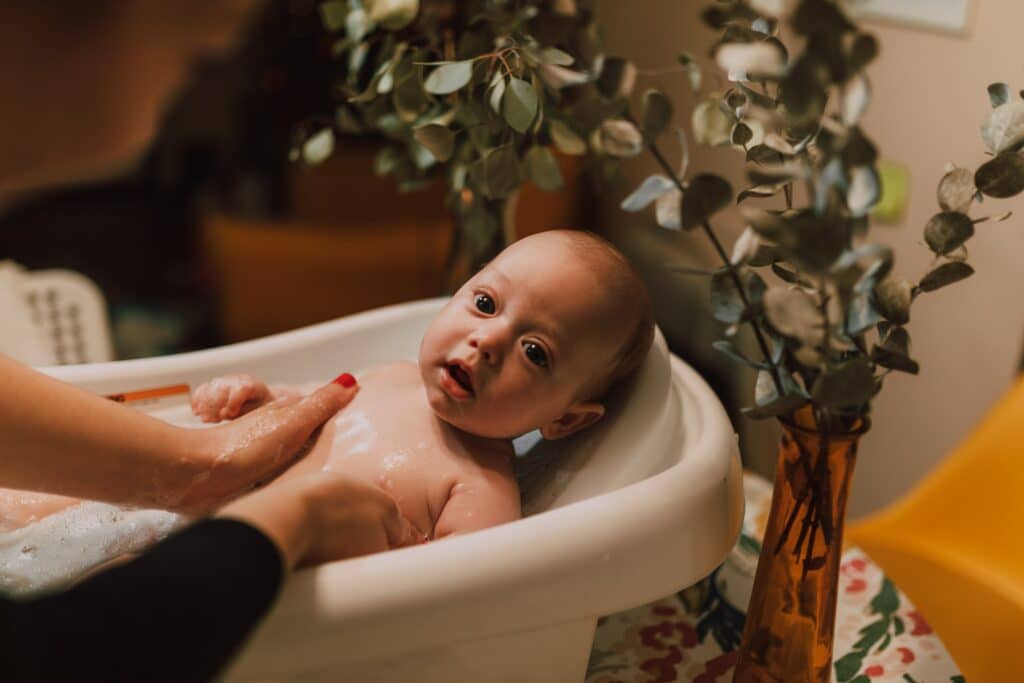
Can soap in baby’s eyes cause blindness?
Experts agree that getting soap in your baby’s eyes will likely only result in irritation or a mild injury.
Though not it is not likely to result in severe injury, it is still important to immediately flush the eye to remove soap from causing excessive irritation.
Extensive injuries, such as loss of vision, corneal scarring, glaucoma, and cataracts, have been reported in cases involving household cleaners like oven cleaner and drain cleaner. These products are much harsher than traditional soaps and should always be kept away from children.
What to do if soap gets in baby’s eyes
Getting soap in your baby’s eyes can be a shock to both you and your baby. Though soap can cause a great deal of irritation, it is unlikely to result in an eye injury, especially if it is removed quickly.
If you get soap in your baby’s eyes, it is important to remain calm so that you can help calm your little one and flush the soap out of your baby’s eyes.
Can you flush a baby’s eye?
If your baby gets soap in their eyes, you should get the soap out of their eyes as quickly as possible to avoid significant irritation or injury. Immediate eye irrigation, or flushing, with large amounts of water has a massive impact on the severity of alkali burns to the eyes.
Depending on the type of soap and concentration, you may be able to remedy the situation with a clean wet washcloth or by squirting a small amount of clean water into their eyes using an eyedropper or syringe. However, if this doesn’t give them relief, you will need to flush their eyes with a substantial amount of water.
To flush a baby’s eyes:
- Fill a pitcher with clean lukewarm water.
- Position your baby over the sink with the affected eye facing down.
- Pull their lower lid down.
- Gently pour water into the eye or eyes.
- Continue flushing for 15 minutes.
Although your baby may seem uncomfortable while you’re flushing their eye, it will be better for them in the long-run to avoid further irritation or injury.
Baby soaps that won’t hurt baby’s eyes
Sometimes, getting soap in your baby’s eye is unavoidable. Luckily, there are a wide variety of baby soaps and shampoos on the market that are formulated to be gentle on baby skin and eyes.
When any soap gets in your baby’s eye, you should clean it immediately. However, you can have peace of mind when you know the ingredients and soap you’re using are safe and gentle for your baby.
Ingredients to avoid:
Aside from very alkaline (pH 9-10) soaps, many ingredients can cause increased eye irritation. These should be avoided when choosing a soap for your baby soap.
Irritating ingredients include:
- Sodium lauryl sulfate
- Fragrance
- Essential Oils
- Parabens
- Preservatives such as formaldehyde
- Active ingredients such as pyrithione zinc
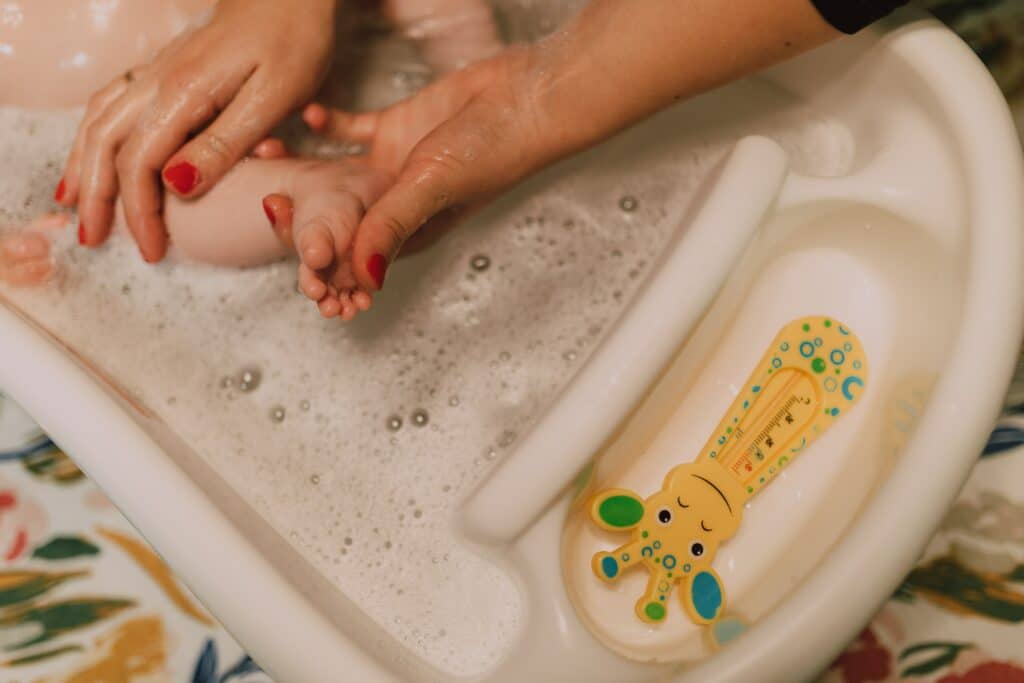
Recommendations for safe baby soap
While getting soap and water in your baby’s eyes will probably still be bothersome, using a mild shampoo or body wash can help reduce any irritation.
Here are some gentle, tear-free baby washes that we love:
- The Honest Company Perfectly Gentle Sweet Orange Vanilla Shampoo + Body Wash, Tear-Free Baby Shampoo is formulated without phthalates, parabens, synthetic fragrances, dyes, formaldehyde, sodium lauryl sulfate, or sodium lauryl ether sulfate. It is a hypoallergenic, tear-free formula that is great for the entire family. They also offer a fragrance-free option for extra-sensitive skin.
- Dove’s Tip to Toe Baby Wash and Shampoo is ophthalmologist, dermatologist, and pediatrician tested. It is made without dyes, parabens, sulfates, or phthalates and is tear-free and hypoallergenic. This body wash/shampoo combo is very rich, which is great for dry skin.
- Mustela Stelatopia, Cleansing Oil, Baby Body Wash is developed for sensitive, eczema-prone skin. It is dermatologist and pediatrician tested. It contains 98% natural ingredients and is free from parabens, steroids, phthalates, phenoxyethanol, and fragrance. It is also completely soap-free, using oil to gently cleanse the skin.
- Mustela Cradle Cap Foam Shampoo for Newborns is a widely recommended shampoo that is designed to treat and reduce the occurrence of cradle cap. Unlike many other cradle cap treatments, this is a tear-free formula. It is also dermatologist and pediatrician tested and free of parabens, phthalates, phenoxyethanol, dyes, and fragrance.
- Free & Clear Liquid Cleanser, though not specifically formulated for babies, is gentle enough for your little one. It is dermatologist tested and is formulated without dyes, fragrance, masking fragrance, parabens, formaldehyde, sulfate, and gluten.
| Image | Title | Price | Prime | Buy |
|---|---|---|---|---|
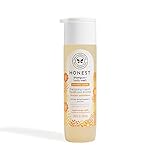 Top
Top | The Honest Company Perfectly Gentle Sweet Orange Vanilla Shampoo + Body Wash | PrimeEligible | Buy Now | |
 Top
Top | Baby Dove Tip to Toe Baby Wash and Shampoo | PrimeEligible | Buy Now | |
 Top
Top | Mustela Stelatopia Cleansing Gel - Baby Cleanser Face & Body Wash | PrimeEligible | Buy Now | |
 Top
Top | Mustela Foam Shampoo for Newborns, Baby Shampoo, Cradle Cap | PrimeEligible | Buy Now | |
 Top
Top | Free & Clear Liquid Cleanser | PrimeEligible | Buy Now |
Product prices and availability are accurate as of the date/time indicated and are subject to change. Any price and availability information displayed on [relevant Amazon Site(s), as applicable] at the time of purchase will apply to the purchase of this product.
Prices pulled from the Amazon Product Advertising API on:Frequently Asked Questions (FAQs)
Should I be worried if I got soap in my eye?
While getting soap in your eyes is unlikely to cause permanent damage, the best remedy is to immediately wipe or flush your eye with warm water to remove the soap. This helps to prevent mild injury or irritation.
How do you get shampoo out of a child’s eye?
If you got shampoo in your baby’s eye, first wipe their eye with a wet washcloth. After wiping their eye, if they still seem distressed, you can flush their eye with warm water to remove any remaining shampoo.
How do I keep water out of my baby’s eyes during a bath?
To keep water out of your baby’s eye during a bath, you can use a wet washcloth to cleanse their hair. If they’re old enough to sit up, you can use a small cup to rinse their hair, placing your hand at the top of their head to prevent water from getting into their eyes.
Can you flush a baby’s eye with water?
Flushing your baby’s eyes with warm water is an effective way to prevent injury if soap or shampoo gets in. You can do this by positioning them over the sink and gently pouring warm water into their eyes.
Conclusion
No parent likes to see their little one in pain, even if it’s temporary. If you got soap in baby’s eye, the best remedy is to immediately remove the soap by wiping or flushing their eyes with warm water.
While baby soap is unlikely to cause severe damage, it can still cause irritation or mild injury if left untreated. You can also have peace of mind by choosing safe ingredients and tear-free soap or shampoo for your little one.

